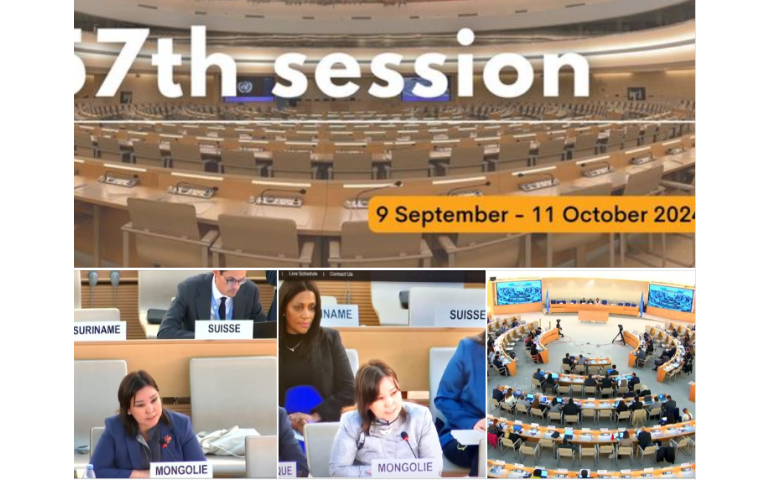THE 57TH REGULAR SESSION OF THE UN HUMAN RIGHTS COUNCIL TAKES PLACE IN GENEVA
The 57th regular session of the UN Human Rights Council (HRC), which began on September 9, 2024, in Geneva, concluded its work today after convening for a total of five weeks. In addition to general debates on a broad spectrum of human rights issues, the Council this session held 27 interactive dialogues with Special procedures mandate holders and investigative mechanisms of the Council.
Mongolian delegation led by Permanent Representative and Ambassador Gerelmaa Davaasuren participated in the 57th session and contributed to its discussions. On September 13, Permanent Representative D. Gerelmaa took part in the discussion with the UN Independent Expert on Older Persons, Ms. Claudia Mahler and presented on the legal framework of Mongolia in the field of promoting and protecting the rights of the elderly, measures taken by the Government and the pertinent challenges faced in this regard.
Furthermore, within the framework of the general debate of the Counsil session, on September 19, Ambassador Gerelmaa delivered, on behalf of the core group (Belgium, Benin, Costa Rica, Mexico, Moldova, Mongolia, France, and Switzerland) of the HRC resolution on the question of the death penalty, a Joint statement on the issue of the abolition of the death penalty. On September 20, Ambassador Gerelmaa presented a national statement on the issue of gender equality, rights of women and girls, and informed the Council of the “Ulaanbaatar Declaration”- outcome document adopted from the "World Women's Forum" convened in Ulaanbaatar on August 22-23 under the auspices of the President of Mongolia, H.E. Mr. Ukhnaagiin Khurelsukh. She expressed Mongolia’s readiness to collaborate with Member States in the realization of the said Declaration.
In addition, Mongolia joined several Joint statements initiated by other Member States, such as on "Vaccination, immunization, and the enjoyment of the right to health” (Vietnam), International Day of Peace (Qatar), “Ensuring access to sexual and reproductive health and rights for women and girls with disabilities" (Finland , Malawi), “Human Rights and Transnational Organized Crime” (Chile), “Water and Peace”, “Climate Change and Internally Displaced Persons” (Iraq), and “Promotion of Universality of the Standing Invitations to Special Procedures Mandate Holders (Latvia).


